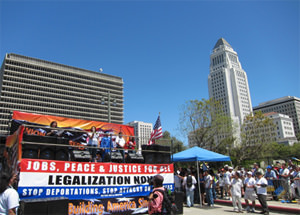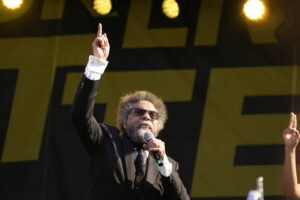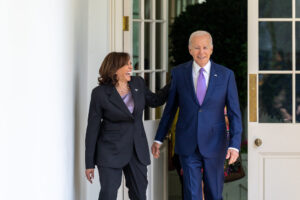May Day: A Festival of Solidarity
This year, the May Day march in Los Angeles was notably smaller than in recent years, but still lively and militant The year-by-year count of May Day marchers can never be an exact science, but the history of labor is full of surprises.
May Day is a celebration of working-class solidarity that grew out of the struggle for the eight-hour workday at the end of the 19th century. For well over a century, workers of all parties and tendencies of the left have participated in May Day marches around the world.
An immense May Day march took place in Los Angeles in 2006, when Latino immigrant groups and labor unions mobilized to oppose H.R. 4437, titled “The Border Protection, Anti-terrorism, and Illegal Immigration Control Act of 2005.” It was more commonly known as the Sensenbrenner Bill, after a chief sponsor in Congress, Rep. Jim Sensenbrenner of Wisconsin, a Republican.
Police assaults on workers and marchers at the 2007 May Day rally in MacArthur Park in Los Angeles resulted in a further protest march and in legal suits against the police department.
In 2008, the Longshore and Warehouse Union called for a May Day strike, refusing to move cargo in West Coast ports as a protest against the Iraq War and the diversion of public funds away from social needs and services.
This year, the May Day march in Los Angeles was notably smaller than in recent years, but still lively and militant. The year-by-year count of May Day marchers can never be an exact science, but the history of labor is full of surprises. Currents of working-class discontent deepen in times of relative quietude, and then break out again in storms of public protest. Immediate threats, such as the Sensenbrenner Bill, were well publicized through the Spanish radio stations of Los Angeles in 2006, and young Latino students carried the message throughout the schools of the city. In big election years, the labor unions with closest ties to the Democratic Party also organize with greater drive and discipline.
This year, the legislative assaults on immigrant workers in Arizona and on public-sector unions in Wisconsin were well noted by many unions and other groups and on many banners. Almost the full spectrum of the left turned out with their flags and leaflets. Anarchists, socialists, communists and friends of labor of all persuasions chanted slogans and marched in a multiplicity of contingents.
Once again, dancers in Mayan and Aztec robes and feathers were dazzling. The Queer Contingent carried its own banner and dozens of rainbow flags. Various affinity groups performed skits and street theater along the march route, beginning at Olympic and Broadway and ending with a rally near City Hall at First and Broadway. The anarcho-syndicalist contingent proudly flew the half-red, half-black flag associated with the libertarian left, and especially with the anarchist workers and fighters of Spain. Leninist groups and parties passed out their papers and programs. Democratic socialists mixed and mingled throughout the march among the labor unions and civic groups. At one corner you might find an anarchist punk rock band, and at the next a sweet couple holding a sign reading “Make War Against Wage Slavery.”
Good Jobs LA, a coalition of labor unions and activists, was well organized and stayed on message, directing .reporters to designated teams of spokespeople. Their leaflets noted that Wells Fargo had avoided paying $555 million in taxes, enough money to “restore all planned cuts in California’s in-home care services for the sick.” As the same leaflet said, “General Electric got a $1.3 billion tax cut. That’s enough to pay the salaries of all 19,000 public school teachers facing layoffs because of the state budget crisis.” Both corporations eliminated many thousands of jobs, with GE cutting 32,000 jobs since 2006.
I asked Marissa Ruiz, a Good Jobs LA spokeswoman from the Service Employees International Union, Local 721, about the main message of the coalition.
“Corporations and CEOs are taking advantage of workers, especially low-wage workers,” she answered. “They are relentless, they are stripping workers of all the rights and benefits we fought for over the years. So today we are marching in solidarity with all working people, regardless of whether you belong to a union or not, and regardless of whether you are a documented or undocumented worker.”
When I asked Ruiz if Good Jobs LA had a political strategy to keep the Democratic Party accountable to workers and labor unions, she answered, “We are turning out in the streets to keep them [Democratic leaders] accountable. Talk to friends and co-workers and neighbors. Raise your voices!”
Organized labor is in big trouble in this country. In the 1950s, 30 percent of American workers belonged to labor unions. By 2000, that percentage had dropped to 12 percent and has been fluctuating near that level ever since. The official unemployment rate reached 12 percent earlier this year in California, but even that number is too optimistic because the counting system is based on people collecting unemployment benefits. We have no definite count of those who cannot even collect such benefits, so the number of those out of work and near desperation is certainly higher.
Home foreclosures wiped out one version of the American dream for many first-time homeowners. But the biggest cause of personal bankruptcy in this country is our lack of a rational health care system for all, because a single bad accident or a chronic disease can mean both medical and financial disaster. The Democratic Party offers hope and change in every big election — and then takes over the management of war and empire if it happens to gain a majority in Congress. Just as the public has no true accounting of the numbers of unemployed, so we have no true accounting of the total military budget. Lawyers, lobbyists and legislators have made the military budget one of the more difficult state secrets to break open to public view. Until the labor unions in the United States make a radical break with what President Dwight D. Eisenhower called “the military-industrial complex,” working people will bear the brunt of sacrifice in lost jobs, broken health and imperial wars.
The real power of workers comes from below, not from union bureaucrats and career politicians. Labor unions and the Democratic Party have had a bad marriage for decades, but the leaders of the big unions have never dared to advise workers to seek an open divorce. Even so, there are notable voices of dissent even in the upper echelons of the union bureaucracy. Harold A. Schaitberger, head of the 300,000 members of the International Association of Fire Fighters, recently announced that this union would suspend donations to federal candidates out of deep disillusion with congressional Democrats. Schaitberger was quoted in The New York Times on April 27:
“We’re tired that our friends have not been willing to stand up and fight back on our behalf with the same ferocity, the same commitment that our enemies have in trying to destroy our members’ rights. Quite frankly, our enemies are trying to kill us as a labor movement and union trying to represent workers and help the middle class.”
In Los Angeles, every class-conscious worker cannot help but be aware of the sharpening attacks on workers, designed to fracture the whole labor movement along lines of race, sex, wage scales and disparate benefits. When those fractures follow the lines drawn upon maps of the world, then the great beast of nationalism comes round once again to devour our hearts and minds. Nationalism is bloody idol worship, a cult of the state and the military demanding regular theft of treasure beyond our borders, and regular human sacrifice of soldiers and civilians.
We who live in the country’s southwestern region know well that the United States ships loads of weapons south of the border, and that Mexico ships loads of drugs north of the border. This is one consequence of the hemispheric hurricane that bore the innocent-sounding title of the North American Free Trade Agreement, or NAFTA. This regional economic calamity was bound to cross borders, and so it did. When we fight the corporate state, then we also create the beginning of working-class justice on both sides of the border.
We know our financial system is a den of thieves, and President Barack Obama has filled his Cabinet and inner circle with Wall Street insiders and recycled Clintonistas. When we are likewise willing to acknowledge that our whole political system is broken—or rather, is expertly designed to maintain a corporate ruling class in the style to which it has grown accustomed—then we will find the strength to fight for democracy. This must begin with wide reformation of our rigged electoral system, which was designed to lock out all challengers of “the two-party system.” We can have “the two-party system” in this country or we can have democracy, but we cannot have both.
A journalist should strive to find the truth and tell it plainly, without favor or prejudice. But a democratic socialist doing any honest work whatsoever—whether as a writer, a plumber, a nurse, a firefighter—must go further than refusing to tell lies, or telling the truth in small doses likely to go down sweetly. The truth must be told plainly even and especially against our own failures in labor unions and in the socialist movement.
Free councils of workers are the foundation of democratic socialism. Start small and start now. Make each May Day a festival of solidarity, and a general strike against war and empire.
Click here to see a gallery of photos from May Day 2011 in Los Angeles.
Your support matters…Independent journalism is under threat and overshadowed by heavily funded mainstream media.
You can help level the playing field. Become a member.
Your tax-deductible contribution keeps us digging beneath the headlines to give you thought-provoking, investigative reporting and analysis that unearths what's really happening- without compromise.
Give today to support our courageous, independent journalists.






You need to be a supporter to comment.
There are currently no responses to this article.
Be the first to respond.